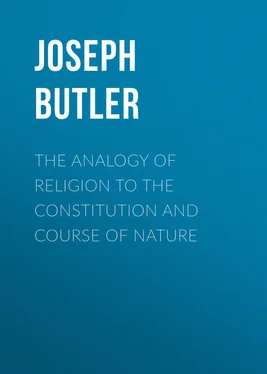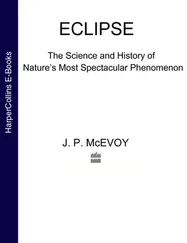Joseph Butler - The Analogy of Religion to the Constitution and Course of Nature
Здесь есть возможность читать онлайн «Joseph Butler - The Analogy of Religion to the Constitution and Course of Nature» — ознакомительный отрывок электронной книги совершенно бесплатно, а после прочтения отрывка купить полную версию. В некоторых случаях можно слушать аудио, скачать через торрент в формате fb2 и присутствует краткое содержание. Жанр: foreign_antique, foreign_prose, на английском языке. Описание произведения, (предисловие) а так же отзывы посетителей доступны на портале библиотеки ЛибКат.
- Название:The Analogy of Religion to the Constitution and Course of Nature
- Автор:
- Жанр:
- Год:неизвестен
- ISBN:нет данных
- Рейтинг книги:3 / 5. Голосов: 1
-
Избранное:Добавить в избранное
- Отзывы:
-
Ваша оценка:
- 60
- 1
- 2
- 3
- 4
- 5
The Analogy of Religion to the Constitution and Course of Nature: краткое содержание, описание и аннотация
Предлагаем к чтению аннотацию, описание, краткое содержание или предисловие (зависит от того, что написал сам автор книги «The Analogy of Religion to the Constitution and Course of Nature»). Если вы не нашли необходимую информацию о книге — напишите в комментариях, мы постараемся отыскать её.
The Analogy of Religion to the Constitution and Course of Nature — читать онлайн ознакомительный отрывок
Ниже представлен текст книги, разбитый по страницам. Система сохранения места последней прочитанной страницы, позволяет с удобством читать онлайн бесплатно книгу «The Analogy of Religion to the Constitution and Course of Nature», без необходимости каждый раз заново искать на чём Вы остановились. Поставьте закладку, и сможете в любой момент перейти на страницу, на которой закончили чтение.
Интервал:
Закладка:
2.) Or as an example to others.
1.They are matters of daily experience.
2.Proceed from the general laws, by which the world is governed.
e. g. Proverbs, ch. i.
The analogy sufficiently answers all objections against the Scripture doctrine of future punishment, such as
1.) That our frailty or temptations annihilate the guilt of vice.
2.) Or the objection from necessity.
3.) Or that the Almighty cannot be contradicted.
4.) Or that he cannot be offended.
1.Such reflections are terrific, but ought to be stated and considered.
2.Disregard of a hereafter cannot be justified by any thing short of a demonstration of atheism. Even skeptical doctrines afford no justification.
3.There is no pretence of reason for presuming that the licentious will not find it better for them that they had never been born.
As the structure of the world shows intelligence , so the mode of distributing pleasure and pain, shows government. That is, God’s natural government, such as a king exercises over his subjects.
But this does not, at first sight, determine what is the moral character of such government.
1.Not mere rewarding and punishing.
2.But doing this according to character.
3.The perfection of moral government is doing this exactly .
Objec. God is simply and absolutely benevolent.
Ans. Benevolence, infinite in degree, would dispose him to produce the greatest possible happiness, regardless of behaviour. This would rob God of other attributes; and should not be asserted unless it can be proved. And whether it can be proved is not the point now in hand.
The question is not whether there may not be, in the universe, beings to whom he manifests absolute benevolence, which might not be incompatible with justice; but whether he treats us so.
4.It must be owned to be vastly difficult, in such a disordered world, to estimate with exactness the overplus of happiness on the side of virtue: and there may be exceptions to the rule. But it is far from being doubtful that on the whole , virtue is happier than vice, in this world.
1.It has been proved (ch. ii.) that God governs : and it is reasonable to suppose that he would govern righteously .
1.) Any other rule of government would be harder to account for.
2.) The Bible doctrine that hereafter the good shall be happy, and the wicked miserable, is no more than an expectation that a method of government, now begun, shall be carried on.
2.The opposite consequences of prudence and rashness, show a right constitution of nature; and our ability to foresee and control these consequences, shows that we are under moral law.
3.God has so constructed society that vice, to a great degree, is actually punished by it.
1.) Without this, society could not exist.
2.) This is God’s government, through society; and is as natural , as society.
3.) Since the course of things is God’s appointment, men are unavoidably accountable for their behaviour.
Objec. Society often punishes good actions, and rewards wickedness.
Ans. 1. This is not necessary , and consequently not natural.
2. Good actions are never punished by society as good , but because considered bad.
4.By the course of nature, virtue is rewarded, and vice punished, as such , which proves a moral government; as will be seen if we rightly distinguish between actions and their qualities.
1.) An action may produce present gratification though it be wrong: in which case the gratification is in the act, not the morality of it: in other cases the enjoyment consists wholly in the quality of virtuousness.
2.) Vice is naturally attended with uneasiness, apprehension, vexation, remorse, &c.
– This is a very different feeling from that produced by mere misfortune.
– Men comfort themselves under misfortune, that it was not their own fault.
3.) Honest and good men are befriended as such .
4.) Injuries are resented as implying fault; and good offices are regarded with gratitude on account of the intention , even when they fail to benefit us.
– This is seen in family government, where children are punished for falsehood, fretfulness, &c., though no one is hurt.
– And also in civil government, where the absence or presence of ill intention goes far in determining the penalty of wrong-doing.
5.) The whole course of the world, in all ages and relations, turns much upon approbation and disapprobation.
6.) The very fact of our having a moral nature, is a proof of our being under God’s moral government.
– We are placed in a condition which unavoidably operates on our moral nature.
– Hence it arises that reward to virtue and reprobation of vice, as such, is a rule , never inverted. If it be thought that there are instances to the contrary, (which is not so,) they are evidently monstrous.
– The degree in which virtue and vice receive proper returns, is not the question now, but only the thing itself, in some degree.
7.) It is admitted that virtue sometimes suffers, and vice prospers; but this is disorder , and not the order of nature.
8.) It follows, that we have in the government of the world, a declaration from God, for virtue and against vice. So far as a man is true to virtue, is he on the side of the divine administration. Such a man must have a sense of security , and a hope of something better .
5.This hope is confirmed by observing that virtue has necessary tendencies beyond their present effects.
1.) These are very obvious with regard to individuals.
2.) Are as real, though not so patent, in regard to society.
– The power of a society under the direction of virtue, tends to prevail over power not so directed, just as power under direction of reason, tends to prevail over brute force.
– As this may not be conceded, we will notice how the case stands, as to reason:
· Length of time, and proper opportunity, are necessary for reason to triumph over brutes.
· Rational beings, disunited, envious, unjust, and treacherous, may be overcome by brutes, uniting themselves by instinct: but this would be an inverted order of things.
– A like tendency has virtue to produce superiority.
· By making the good of society, the object of every member of it.
· By making every one industrious in his own sphere.
· By uniting all in one bond of veracity and justice.
3.) If the part of God’s government which we see, and the part we do not see, make up one scheme, then we see a tendency in virtue to superiority.
4.) But to produce that superiority there must be
– A force proportioned to the obstacles.
– Sufficient lapse of time.
– A fair field of trial; such as extent of time, adequate occasions, and opportunities for the virtuous to unite.
Читать дальшеИнтервал:
Закладка:
Похожие книги на «The Analogy of Religion to the Constitution and Course of Nature»
Представляем Вашему вниманию похожие книги на «The Analogy of Religion to the Constitution and Course of Nature» списком для выбора. Мы отобрали схожую по названию и смыслу литературу в надежде предоставить читателям больше вариантов отыскать новые, интересные, ещё непрочитанные произведения.
Обсуждение, отзывы о книге «The Analogy of Religion to the Constitution and Course of Nature» и просто собственные мнения читателей. Оставьте ваши комментарии, напишите, что Вы думаете о произведении, его смысле или главных героях. Укажите что конкретно понравилось, а что нет, и почему Вы так считаете.












